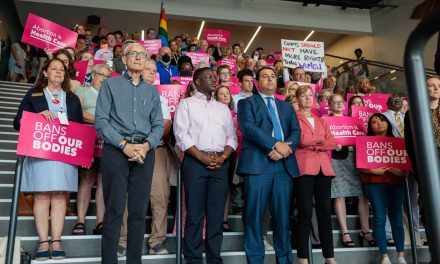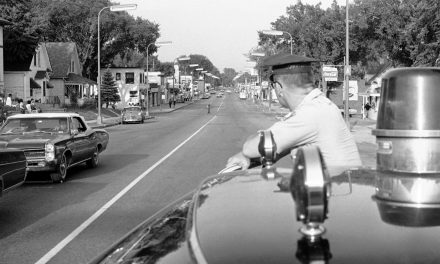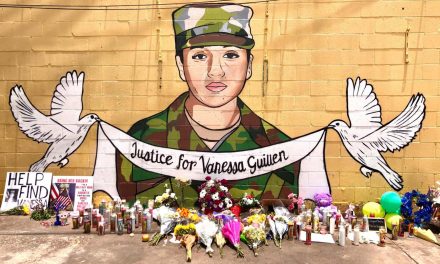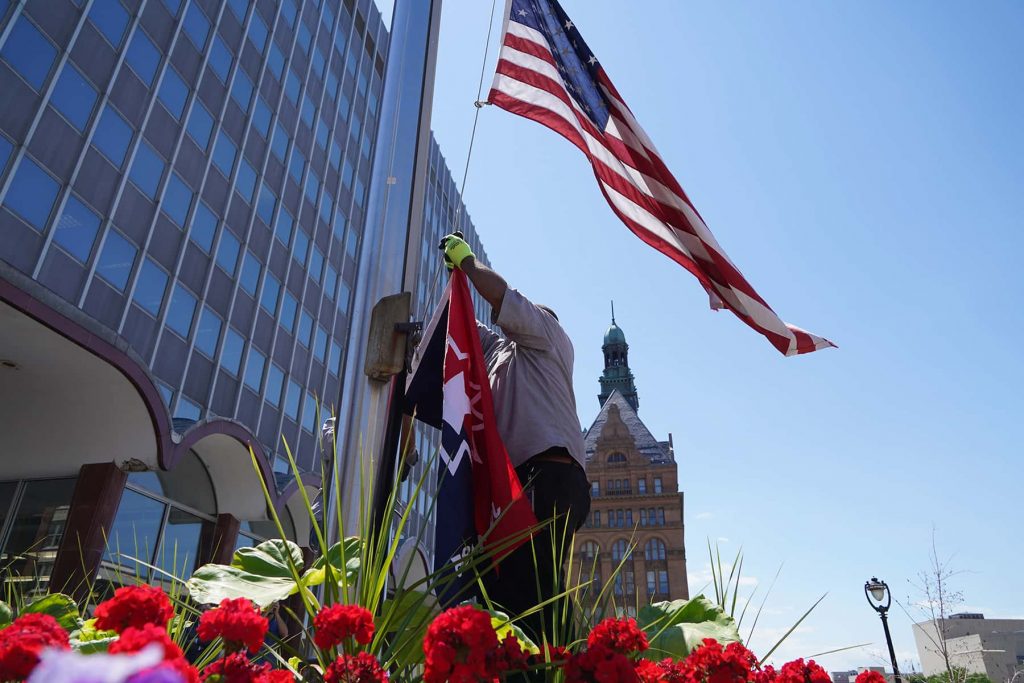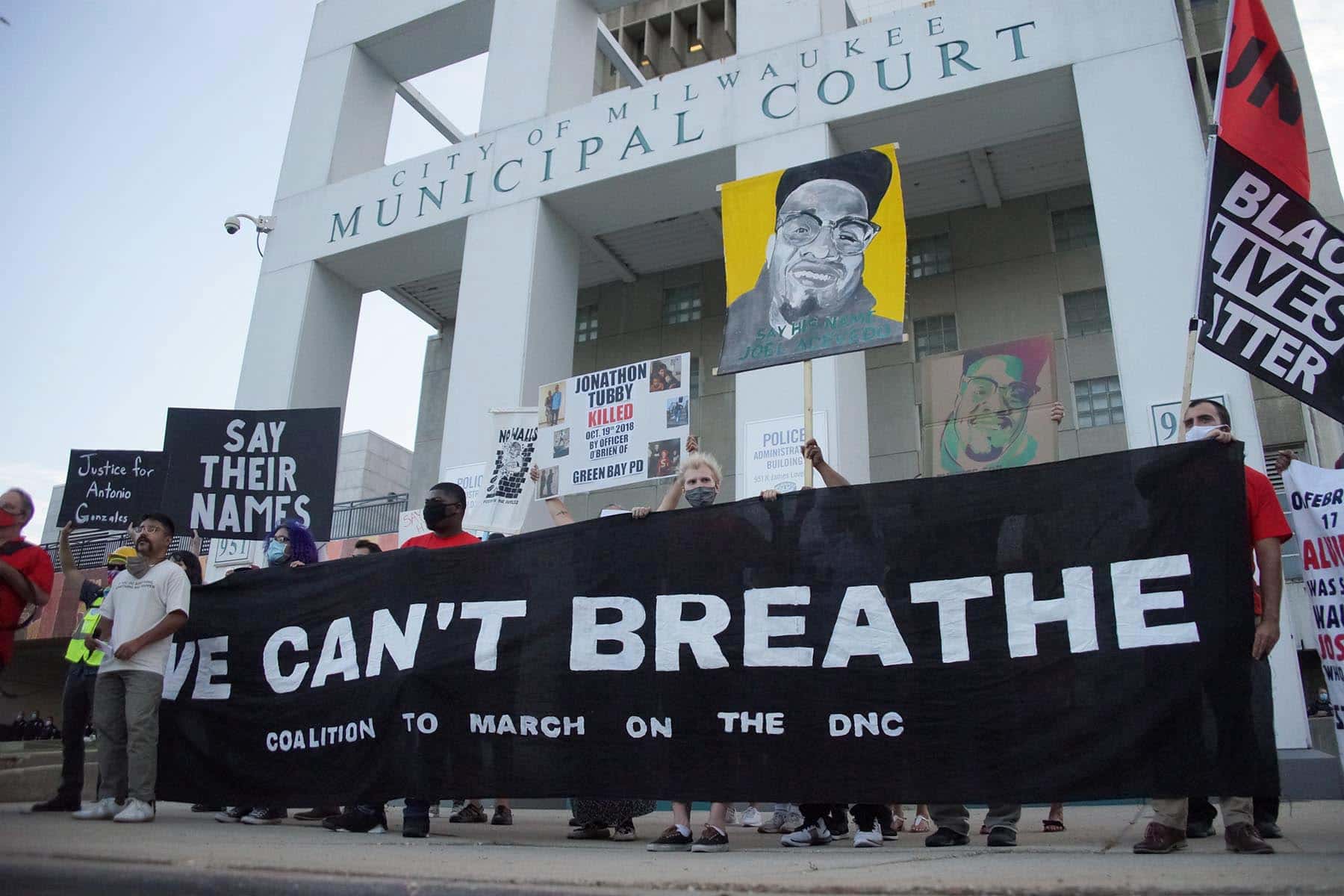
Police in Milwaukee are now banned from using chokeholds, following a unanimous vote by the Fire and Police Commission. The FPC meeting was preceded by weeks of organizing by residents and activists pushing for the ban on a hold officers were not trained to utilize. Community members emphasized the importance of banning chokeholds, “without exception,” hoping to close any loopholes in the policy.
Commissioner Amanda Avalos echoed the point in a statement made shortly before the FPC voted.
“I don’t think I need to explain the urgency around why adding language in our policies around banning chokeholds, with no exceptions, is critically important for everyone’s safety,” said Avalos. “We’ve seen across the country how many times this ends up killing people, specifically Black and brown people, who we know are historically the communities most policed, harmed, incarcerated and killed. My role, as a commissioner, is to make sure that we’re affording every possible protection to the general public and community members. And not just for the people in our police and fire departments.”
Avalos added that, “the harm that chokeholds can potentially have on our general public is far greater than the less probable risk of an officer’s life being put in that level of danger with no other option.”
Police officers undergo extensive training on how to de-escalate situations to keep themselves and others safe, Avalos pointed out. “Chokeholds are not a trained tactic of the Milwaukee Police Department.”
For activists on the ground, the names of several people killed by police using chokehold-like maneuvers come to mind. Few, however, hit as close to home as the death of Joel Acevedo. The 25-year-old died after being placed in a chokehold for several minutes by off-duty Milwaukee officer Michael Mattioli, who was later arrested and charged, Mattioli resigned from the department. Acevedo’s death is still under investigation.
Avecedo’s name is commonly chanted during the still ongoing Black Lives Matter marches in Milwaukee, which started almost a year ago after the murder of George Floyd by Minneapolis police. The FPC meeting synced up with Day 342 of the Milwaukee protests.
The People’s Revolution (TPR), a group of residents who have marched in various areas of Wisconsin since May 29 of last year, held a press conference at Milwaukee’s City Hall prior to the FPC meeting to make their demands known. TPR was joined by elected officials and organizers from other community groups including COM Force MKE.
Kamila Ahmed, a Milwaukee resident and a protester with TPR, stressed that many in the community do not feel safe.
“We are heavily policed with military-style tactics that do not serve us,” said Ahmed. “We should not have to fear for our lives by those who are sworn to protect and serve us. Police officers should not have the authority to choke someone until they die.” ReBecca Burrell, another Milwaukee resident, added, “Here, in Milwaukee, in Wisconsin, we are seeking uniformity with our brothers and sisters across the nation when it comes to banning chokeholds with no exceptions.”
Cities elsewhere in the county, including Minneapolis, have explored banning the use of chokeholds. However, not all who’ve kept a close eye on this issue want to just stop at a chokehold ban. Some pointed to other aspects of MPD’s use of force policies which need to be addressed. Others shared concerns that pending legislation in the Senate, could one day affect the FPC’s ability to hold officers accountable for violating the chokehold ban.
“A judge recently ordered that the video in the Joel Acevedo case must be released,” said activist Vaun Mayes, a founder of COM Force MKE, during the TPR press conference. “I contend that once that video is shown, we will see the answer we all know to this question, that shouldn’t be being asked. The question I pose instead, is for the commission and/or the department to tell us one instance where there has been a life and death struggle, where a chokehold was necessary. This is a no-brainer, all chokeholds must be banned.”
Black Leaders Organizing Communities (BLOC) released a statement noting that the police union wanted an exception to the ban in cases where officers feel that their lives are in immediate danger. “Police want flexibility to use lethal force in case they feel threatened,” BLOC stated “The problem with that exception to a ban, is that ‘feeling threatened’ is subjective.”
Mayes also expressed concern that problems with the police go beyond whether they can use chokeholds.
“We don’t have a chokehold problem here. So this is a detour of a conversation where we should be focusing on things that actually happen all the time.”
State Representative David Bowen said he hoped the ban on chokeholds could be a uniting cause for residents in the streets and law enforcement leadership.
“We have a chance to lead,” said Bowen. “And I speak to members of the law enforcement leaders and members of the law enforcement community here, many of whom I respect [and we] have had many long conversations, and long engagements, many of whom have served decades on our police department, many who are Black and have, for years, never used lethal force in any circumstance in their whole career. We know that we can have a police department that can lead, and not risk the lives of those they should be serving. This is a defining moment for the Fire and Police Commission.”
Isiah Holmes
Lee Matz
Originally published on the Wisconsin Examiner as Ban on chokeholds in Milwaukee is a first step
Donate: Wisconsin Examiner
Help spread Wisconsin news, relentless reporting, unheard voices, and untold stories. Make a difference with a tax-deductible contribution to the Wisconsin Examiner

